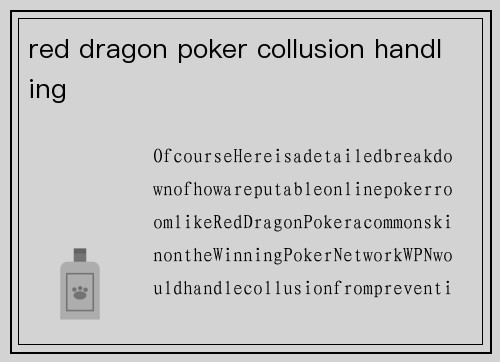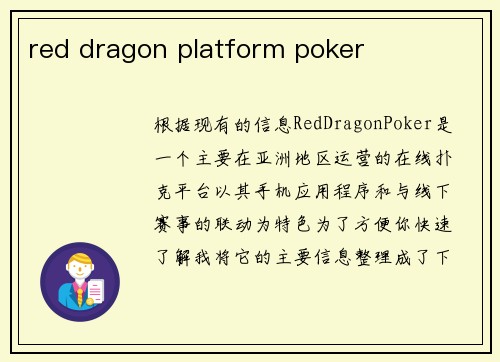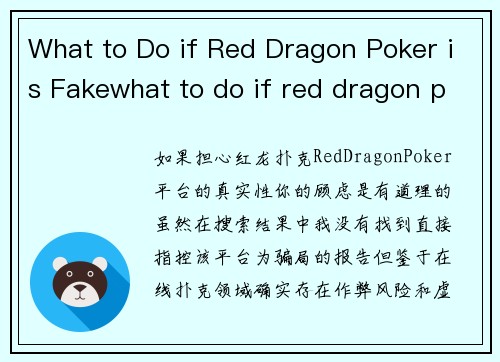red dragon poker collusion handling
Of course. Here is a detailed breakdown of how a reputable online poker room like "Red Dragon Poker" (a common skin on the Winning Poker Network
Understanding Collusion in Poker
First, let's define collusion, as it's the core issue:
* Soft Playing: Two or more players at the same table intentionally avoid betting or raising against each other. This preserves each other's chips and unfairly targets the honest players.
* Chip Dumping: One player intentionally loses a large pot to another, effectively transferring chips. This is often used for money laundering, bonus abuse, or boosting a partner's stack.
* Sharing Hole Cards: Players working together share the contents of their private cards via an external communication method (phone, chat app), giving them a massive informational advantage.
How Red Dragon Poker (WPN) Handles Collusion: A Multi-Layer Defense
A legitimate poker network like WPN employs a sophisticated system to combat collusion.
1. Prevention & Proactive Measures
* IP Address & Geolocation Tracking: The system flags players connecting from the same IP address or a very close geographical location (e.g., the same household) when they are seated at the same table. They are often prevented from playing together entirely in ring games.
* Device Fingerprinting: The security team can identify if multiple accounts are regularly logging in from the same physical computer or device, even if using different IP addresses.
* Robust Terms of Service: The user agreement explicitly forbids collusion, chip dumping, and multi-accounting. By creating an account, players agree to these terms and the potential penalties.
2. Detection: The Security Team's Toolkit
WPN has a dedicated security team that uses advanced software and manual review.
* Algorithmic Analysis: Sophisticated software constantly analyzes hand histories for patterns indicative of collusion:
* Win Rate Analysis: Does one player have an anomalously high win rate against a specific opponent?
* Betting Patterns: The system looks for statistically unlikely actions, like consistently checking down strong hands when two specific players are heads-up.
* Fold Statistics: Does a player fold an unusually high percentage of strong hands pre-flop only when facing a raise from a specific opponent?
* Hand History Audits: When a pattern is flagged by the algorithm or a player is reported, security investigators can manually review the complete hand history. They look at every decision made and compare it to expected behavior.
* Chip Flow Analysis: The team tracks the flow of chips between accounts. A clear, one-way transfer of funds from a losing account to a winning account is a major red flag for chip dumping.
3. Investigation Process
If collusion is suspected, the process is thorough:
1. Flagging: The system or a player report triggers an alert.
2. Data Collection: Investigators gather all relevant data: hand histories, chat logs, login IPs, device IDs, and financial transaction records.

3. Pattern Confirmation: They determine if the suspicious activity is a one-off coincidence or a sustained pattern of cheating.
4. Internal Review: A senior member of the security team typically reviews the evidence before a final decision is made.
4. Sanctions and Penalties
If collusion is confirmed, the penalties are severe and swift:
* Confiscation of Funds: All funds involved in the collusive activity (and sometimes sometimes the entire balance of the accounts) can be confiscated.
* Account Closure: The offending accounts are permanently banned from the site.
* Network-Wide Ban: The players' identities (including linked payment methods and devices) are blacklisted across the entire Winning Poker Network, preventing them from simply creating a new account on a different WPN skin.
* Public Disclosure (Sometimes): While they don't always name the players, networks like WPN have been known to publicly announce that they have banned players and confiscated funds for collusion, serving as a deterrent.
What YOU Should Do If You Suspect Collusion on Red Dragon Poker
As a player, you are a crucial part of the security ecosystem.
1. Gather Evidence: Note the table name, time, and the usernames of the suspected players.
2. Use the "Report Player" Feature: Most poker clients have a right-click option on a player's username to report them. Use this and select the reason (e.g., "Collusion" or "Cheating").
3. Contact Support Directly: For serious concerns, email security support. Provide as much detail as possible.
* Be Specific: Instead of "These two are cheating," say "At table 'Blue Lagoon NL50,' players 'UserA' and 'UserB' checked down a full house and a flush on a board of Ks-Qs-9s-2s-Jh on 10/26/2023 at approximately 8:15 PM UTC. I have observed them soft-playing each other for the past 30 minutes.
* Request Hand Histories: You can often request your own hand histories for a session from support, which can help you build your case.
德扑圈安卓客户端Key Takeaways
* It's a Cat-and-Mouse Game: Cheaters are always developing new methods, and the security teams are constantly updating their tools to catch them.
* Networks are Highly Motivated: Collusion drives away honest players, which is bad for business. Catching cheaters is in the poker room's direct financial interest.
* Stay Vigilant: If something feels wrong at the table, it might be. Don't hesitate to use the reporting tools. Your report could be the data point that confirms a pattern the algorithms have already detected.
In summary, while no system is 100% perfect, reputable networks like the one hosting Red Dragon Poker employ a comprehensive and multi-faceted approach to detect, investigate, and severely punish collusion to protect the integrity of their games and their honest players.


